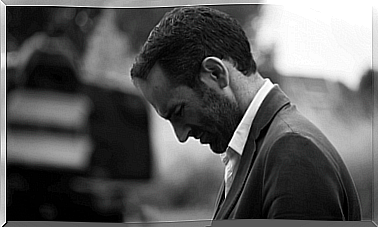Anxiety Disorders: How To Really Help Those Who Suffer From Them

Helping those with anxiety disorders requires tact, empathy and intelligence. It is useless to say “come here, calm down, everything will be fine” or “there is nothing to worry about, you just have to see things from another point of view”. Those suffering from this pathology are tormented by a series of physical and emotional sensations due to which they cannot think clearly.
We must keep this in mind: when we talk about stress or anxiety disorders , there are no immediate ways out. There are no tips or miracles or strategies that will take effect immediately, within a couple of minutes.
The brain does not work as it should, each of its components is invaded by norepinephrine and cortisol, two hormones that cloud thoughts and make us always trapped in the same reactions: avoid and escape.
The amygdala and hippocampus take total control of the brain and from the moment this happens, we only perceive two things: fear and the feeling of being threatened by something.
As if that weren’t enough, the body is subjected to a series of linked effects: tachycardia, sweating, stomach ache, muscle tension. With all of this in mind, how can we relate to people with anxiety disorders without telling them to “calm down”?
It matters little whether there are good intentions or presumed tact. Sometimes with such phrases we bring the loved one to raise a wall in front of us and keep us at a distance. So let’s see what strategies can guide us in our attempt to help a person with anxiety disorders.

How to help a person suffering from anxiety disorders
1. Become aware of his inner world
Living with a person suffering from anxiety is not easy. The mood changes, the motivation fades, and his messages and goals suddenly become very negative. To this is added an excessive sensitivity: she is alarmed at the slightest change, there is no lack of misunderstandings, the ability to concentrate is lowered, she is distracted and even in a bad mood.
If we too allow ourselves to be overwhelmed by his emotions, we will achieve nothing. If we give up and act defensive in the face of any anxiety symptoms, we will intensify the problem and create an asphyxiating environment. For this reason, the first thing to do is to persevere.
Our partner, our father, our brother or that good friend of all time, one of them is going through a difficult period. He suffers from anxiety and, consequently, we must show ourselves more sensitive towards him and deepen our level of knowledge of some aspects of the problem.
We can google what anxiety is. However, what we will read may not correspond to what our loved one is experiencing. First, it is important to know that there are many types of anxiety : panic attacks, generalized anxiety, phobias, obsessive-compulsive mania, and so on.
The ideal is to count on professional help. Only from the moment the patient has received the right diagnosis can we begin to fully understand what he is going through.
2. Address those with anxiety disorders in a certain way
We talked about it at the beginning. To help someone suffering from anxiety disorders, many people do not hesitate to use phrases such as: change records, force yourself, do nothing to get better, there are those who are worse off than you and so on.
For those who receive them, these statements are a sort of B52 that bombards self-esteem.
Below, we explain what changes we should make in the way we communicate with the person suffering from anxiety:
- Demonstrate unconditional support with phrases like “When you need me, I’m there. I want to support you and I love you. They are there at any time ”.
- We don’t have to judge, because anxiety sufferers don’t want to have this problem.
- We try to make the situation as normal as possible: suffering from anxiety disorders is not a brand. It is a disease that must be addressed, treated and managed. We must not run away from it.

3. Be patient, don’t put pressure on, and don’t wait for immediate results
When we want to help someone with anxiety disorders, we often rush to buy books on the subject or search for information on the internet. At the same time, and with all good intentions, we do not even hesitate to dispense advice to the person in question. We suggest breathing techniques, such as exercises of mindfulness as indicated, to play sports, yoga and so on.
In giving these tips, we expect the other person to follow them and to see immediate results. But it’s not always like this. And this is because living with anxiety means sometimes wanting to spend an entire afternoon in bed, in the dark and in silence. And such a thing can be frustrating for those around you.
Another aspect must also be considered. The healing process is subjective and can mean taking small steps.
For this reason, the only thing to do in these cases is to show empathy and patience. The person should not be expected to accept and implement all of our suggestions. What it needs most is our understanding and closeness. But without having to feel pressured.
4. Our support is important, but the help of a specialist is needed
We may want to help someone with anxiety disorders, but don’t know how. We cannot always count on specific formation that gives concrete answers to this condition.
- We must try to persuade those with anxiety to go to a professional.
- We need a suitable diagnosis and therapy.
- At the same time, we must support the person so that he follows the advice of the expert: go to therapy, take medicines and, if necessary, follow a suitable diet. To do this, we need to be able to supervise without putting pressure on for the healing path to work.

We always want the best for the people we love. However, we are not all psychologists. Sometimes, even if we intervene at the root of the problem, we end up generating an adverse response. Just the opposite of what we wanted.
To help a person suffering from anxiety, we need to make the situation as normal as possible and have the help of an expert available. Only in this way will we be able to act and relate in a more determined way, transmitting security with our words and with our advice. At the same time, sharing every progress and victory with these people means giving stimulating support thanks to which it will be possible to perceive the change and make every new attitude, every new goal really effective.









